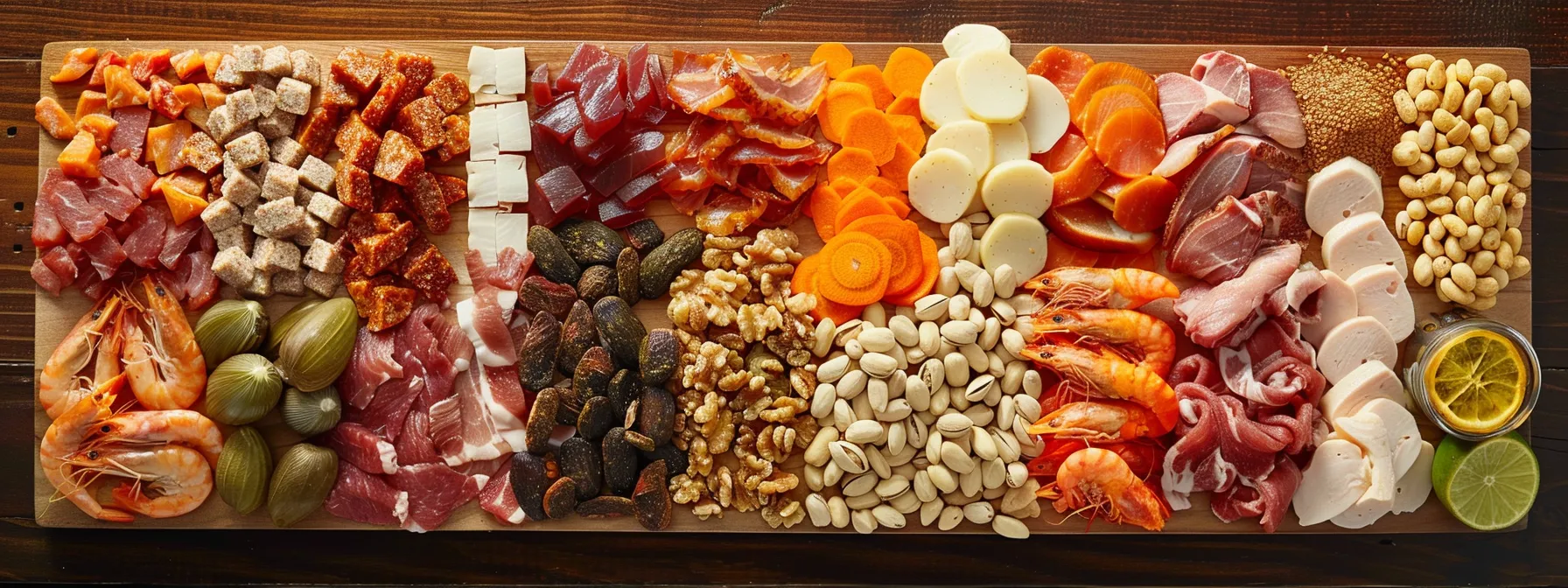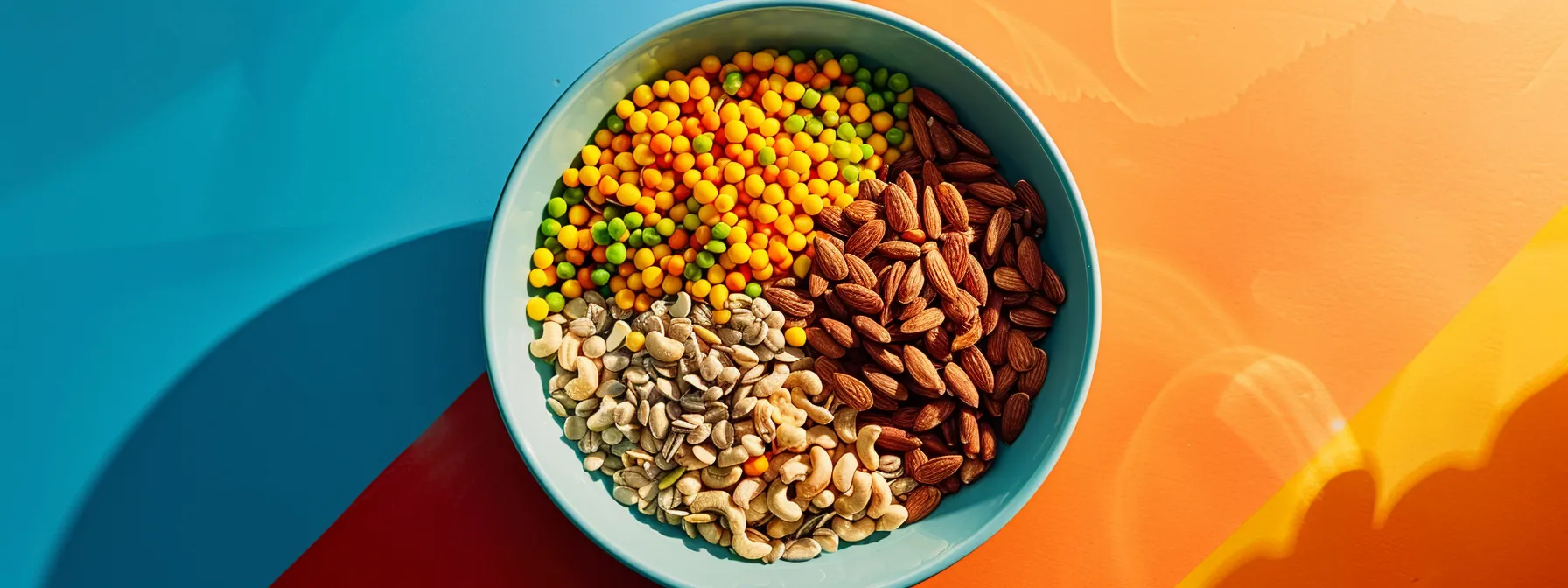Many individuals striving for weight loss overlook the significant impact of dietary protein. Research shows that high protein diets can aid in weight management by promoting better digestion and increasing energy levels. This article will explore the role of protein in weight loss, how to select quality protein sources, and how to create an effective meal plan. Readers struggling with ineffective weight loss methods will find practical insights and solutions that can enhance their results while also addressing concerns related to glucose control and overall health, including a potential link to lower risks of colorectal cancer.
Key Takeaways
- Protein boosts metabolism and supports muscle preservation during weight loss
- High protein intake enhances feelings of fullness and stabilizes blood sugar levels
- Lean meats, seafood, and plant-based proteins are effective for weight management
- Strategic protein timing with meals and exercise optimizes weight loss outcomes
- Balance protein intake with carbohydrates and fats for overall health and nutrition
Understanding the Role of Protein in Weight Loss

Protein plays a crucial role in weight loss by boosting metabolism and supporting muscle preservation while reducing fat. This subsection will explore how protein enhances metabolic rates, influences appetite control, and ensures the maintenance of lean muscle mass during weight loss. Understanding these dynamics is essential for anyone looking to move beyond fad diets and embrace nutrient-rich foods, lose weight fast including sources like pork, that provide essential amino acids.
How Protein Boosts Metabolism
Protein significantly boosts metabolism through several mechanisms, particularly by enhancing energy expenditure during digestion and absorption. When protein-rich foods are consumed, the body requires more energy, or calories, to process them, which leads to an increase in calories burned at the cellular level. Additionally, protein influences the secretion of satiety hormones, such as peptide YY, which helps control appetite and reduces the likelihood of overeating, aligning with the goals of individuals working with a dietitian to create a sustainable weight loss strategy.
The Influence of Protein on Appetite Control
Protein influences appetite control by increasing feelings of fullness, which can significantly reduce hunger levels throughout the day. Higher protein intake helps maintain stable blood sugar levels, potentially reducing the risk of insulin resistance and mitigating cravings for added sugar. Furthermore, understanding the dietary reference intake for protein can guide individuals in making informed choices that promote satiety and support kidney health while pursuing weight loss goals.
Preserving Muscle Mass While Losing Fat
Preserving muscle mass while losing fat is critical for effective weight management. High protein diets can help achieve this by promoting satiety and reducing the loss of lean tissue during caloric restriction. Research from the National Institutes of Health suggests that incorporating protein sources, such as oatmeal or lean meats, coupled with adequate sleep, plays an essential role in maintaining muscle health, supporting the body’s metabolic functions, and enhancing overall weight loss results. By prioritizing protein in meals, individuals can better manage hunger and sustain their energy levels while actively working towards their weight loss goals.
Understanding how protein aids weight loss is only the beginning. Now, it is time to explore how to choose the best sources of protein for your diet.
Selecting High-Quality Protein Sources

Choosing high-quality protein sources is essential for maximizing weight loss. Lean meats and poultry offer good proteins for weight loss, providing necessary nutrients without excessive fats. Seafood and fish proteins present additional benefits, rich in omega-3 fatty acids that support hormone balance. For those preferring plant-based options, tempeh and nuts deliver protein while enhancing overall health. Each protein source contributes uniquely to achieving weight loss goals.
Lean Meat and Poultry Options
Lean meats and poultry are valuable components of high protein diets aimed at weight loss, as they are low in fat while providing essential nutrients. Such protein foods for weight loss help in preserving muscle mass during caloric restriction, making them ideal for individuals looking to maintain a healthy weight. Adding lean sources like chicken breast or turkey to meals not only supports protein intake but also draws attention to the importance of balanced nutrition in reducing the risk of disease while promoting overall health:
- Lean meats provide essential amino acids for muscle preservation.
- Poultry options, such as turkey and chicken, offer low-fat protein choices.
- High protein intake supports metabolic functions and weight management.
Benefits of Seafood and Fish Proteins
Seafood and fish proteins provide numerous advantages for those aiming to maximize weight loss while adopting high-protein diets. These protein sources are typically lower in calories and high in omega-3 fatty acids, which can help regulate inflammation and support heart health. Additionally, integrating seafood into a meal plan enhances nutrient absorption, leading to better overall dietary outcomes, essential for individuals managing chronic kidney disease or considering plans like the Dukan diet that emphasize protein intake:
- Seafood is a lean protein option, contributing to satiety without excessive calories.
- Rich in omega-3 fatty acids, fish supports cardiovascular health.
- Offers essential vitamins and minerals, complementing other protein sources like dairy products and grains.
Plant-Based Protein Alternatives
Plant-based protein alternatives, such as pea protein and peanut products, are excellent choices for those aiming to maximize weight loss while maintaining nutritional balance. These sources not only provide essential amino acids but also offer dietary benefits like improved blood pressure and lower calorie content compared to some animal proteins. Incorporating seeds, such as chia or hemp, into meals can further enhance protein intake and contribute to a satisfying diet that promotes satiety and overall health.
Choosing the right protein sources lays the foundation for a strong body. Next, it’s time to shape these choices into a practical diet plan that fuels your goals.
Crafting an Effective High Protein Diet Plan

Determining optimal protein intake is crucial for those looking to maximize weight loss through high protein diets. This section will discuss balancing proteins with carbohydrates and fats to support overall health, particularly for individuals at risk of type 2 diabetes. Additionally, sample meal plans featuring ingredients like walnuts and cereals will illustrate practical applications, ensuring that dietary choices do not have adverse effects on the gastrointestinal tract.
By exploring these topics, readers will gain practical insights and guidance on developing a sustainable, well-rounded high protein diet plan that promotes weight loss while maintaining nutritional balance.
Determining Your Optimal Protein Intake
Determining optimal protein intake is essential for individuals seeking to maximize weight loss, particularly those who may be managing conditions such as hypertension or obesity. A general recommendation suggests a protein dose ranging from 1.2 to 2.2 grams per kilogram of body weight, depending on activity levels and health status. By customizing protein consumption, individuals can enhance satiety, minimize cravings, and potentially lower the risk of cardiovascular disease, ensuring that their dietary choices align with their overall health goals.
Balancing Proteins With Carbs and Fats
Balancing proteins with carbohydrates and fats is essential for developing an effective high protein diet plan that maximizes weight loss. A well-structured ratio of macronutrients can improve satiety by regulating hormones like ghrelin and various satiety peptides, preventing excessive hunger while promoting energy levels. Additionally, incorporating healthy fats and complex carbohydrates supports overall nutrition, fosters bone health, and ensures lasting energy throughout the day, making it easier for individuals to adhere to their weight management goals.
Sample Meal Plans for Weight Loss
Sample meal plans for weight loss focusing on high protein diets provide practical structures to meet dietary needs while promoting effective weight loss. For instance, a daily plan may include grilled salmon with a tablespoon of olive oil and a side of quinoa, which delivers essential nutrients and aligns with the Mediterranean diet philosophy. Additionally, individuals can adjust protein quantities based on their body weight in kilograms, ensuring they meet their personal requirements without compromising kidney health, making these meal plans adaptable for various dietary concerns while targeting the best protein diet for weight loss.
Protein fuels strength and builds a sturdy frame. Now, it plays a crucial role in shedding unwanted pounds, making it essential for anyone seeking effective weight loss.
Enhancing Weight Loss Results With Protein

Timing protein consumption strategically can amplify weight loss results by enhancing metabolic responses. Additionally, combining protein intake with exercise fosters muscle preservation and growth, crucial for combating metabolic syndrome. Lastly, hydration plays a vital role in protein diets, supporting overall metabolic health. Each of these factors contributes to effective meal planning, ensuring optimal nutrient intake for weight loss efforts while reducing pain associated with dieting.
Timing Protein Consumption for Maximum Impact
Timing protein consumption strategically is crucial for those striving to maximize weight loss through high protein diets. Evidence suggests that consuming protein-rich meals, particularly incorporating sources like oily fish, can optimize metabolic functions and enhance satiety, which helps manage hunger levels effectively. Eating protein at key intervals throughout the day potentially reduces pressure on the body to excrete excess nutrients, supporting weight management for individuals dealing with overweight challenges.
Combining Protein Intake With Exercise
Combining protein intake with exercise significantly enhances weight loss results by promoting muscle preservation and fat reduction. Engaging in regular physical activity, coupled with adequate protein consumption, helps maintain lean muscle mass, which is vital for a healthy metabolism. A systematic review highlighted that individuals, especially those dealing with malnutrition or during breastfeeding, benefit from integrating sources like red meat into their diets, as these contribute essential amino acids that aid recovery and optimize overall body composition.
Hydration and Its Role in Protein Diets
Proper hydration plays a significant role in optimizing metabolism, especially when following a high protein diet aimed at weight loss. Water aids in the digestion and absorption of protein-rich foods, such as olive oil and nut butter, ensuring that essential nutrients are utilized effectively. Additionally, incorporating dairy products in moderation can contribute to hydration and enhance protein intake, making it easier for individuals to manage their weight while preventing dehydration, which can hinder progress and energy levels.
As the journey toward weight loss becomes clearer with protein, few face obstacles along the way. Recognizing these challenges and finding practical solutions can make the path much easier.
Potential Challenges and Solutions

Recognizing and avoiding protein deficiencies is vital for those following a high protein diet for weight loss. Managing cravings and hunger pangs helps maintain a balanced lifestyle while adjusting the diet for long-term success ensures sustainability. These aspects provide practical insights into optimizing body mass index, including integrating lean protein foods for weight loss, like tuna, supported by findings from randomized controlled trials.
Recognizing and Avoiding Protein Deficiencies
Recognizing and avoiding protein deficiencies is essential for individuals pursuing high protein diets aimed at maximizing weight loss. Insufficient protein intake can hinder the development of skeletal muscle and affect metabolic processes, as enzymes involved in fat burning require adequate amino acids to function efficiently. Incorporating high-quality protein sources, like lean meat and oil-rich fish, not only supports muscle repair but also aids in maintaining overall health, making it crucial to assess daily protein needs and adjust dietary habits accordingly to achieve optimal weight loss results.
Managing Cravings and Hunger Pangs
Managing cravings and hunger pangs is essential for individuals following high protein diets aimed at maximizing weight loss. Research indicates that balancing protein intake can help regulate insulin levels, which in turn affects cravings. Incorporating the best foods for protein and weight loss, such as lean meats and legumes, can improve satisfaction and keep hunger at bay, while dietary supplements may also support gut microbiota health, making it easier to maintain adherence to dietary goals.
Adjusting the Diet for Long-Term Success
Adjusting the diet for long-term success involves integrating a variety of nutrient-dense foods, including the best protein sources for weight loss, while ensuring adequate dietary fiber intake. Research shows that incorporating foods like beans not only contributes to protein intake but also enhances satiety and digestive health. By focusing on balanced meals and listening to the body’s hunger cues, individuals can develop sustainable habits that support their weight loss journey and overall well-being.
Challenges in adopting a high-protein diet can raise many questions. Now, let’s address the most common inquiries about this approach to eating.
Frequently Asked Questions About High Protein Diets

The suitability of a high protein diet varies across individuals, raising questions about its impacts on energy expenditure and body composition. This section addresses whether such diets are suitable for everyone, explores the potential risks of excessive protein intake, and examines how protein affects kidney health, providing practical insights into maintaining a balanced approach to healthy protein for weight loss.
Is a High Protein Diet Suitable for Everyone?
A high protein diet can be effective for many individuals looking to lose weight, but it may not suit everyone. For those with specific health conditions, such as kidney disease, or those following strict dietary guidelines for Americans, it is essential to consult with a healthcare provider before making significant changes. Additionally, incorporating diverse protein sources, like chickpeas, can enhance nutritional variety while ensuring adequate calcium intake, complementing approaches like the Atkins diet for a more balanced diet.
Can Too Much Protein Be Harmful?
While a protein-rich diet for weight loss can offer significant benefits, consuming too much protein may lead to potential health issues. Excessive protein intake can strain the kidneys, especially for individuals with pre-existing conditions, and may contribute to the risk of sarcopenia, where muscle mass decreases as one ages. Balancing protein consumption with adequate vitamins from varied sources, including poultry and plant-based options, is essential for maintaining overall health and preventing long-term complications.
How Does Protein Affect Kidney Health?
High protein diets can significantly affect kidney health, particularly for individuals with pre-existing kidney conditions. Consuming excessive amounts of protein, especially from sources like processed meat, can increase the workload on the kidneys, leading to elevated levels of waste products in urine. However, for healthy individuals, incorporating lean body mass strategies, including proteins such as almond butter, can support overall metabolic health without overwhelming kidney function, while also aiding in appetite control and weight management.
Conclusion
Maximizing weight loss through high protein diets offers significant benefits, including enhanced metabolism, appetite control, and muscle preservation. By strategically incorporating diverse protein sources, individuals can effectively manage hunger and improve overall health. Understanding protein intake guidelines and balancing macronutrients is crucial for sustainable weight management. Ultimately, adopting a high protein diet empowers individuals to achieve their weight loss goals while maintaining nutritional balance and promoting long-term well-being.
